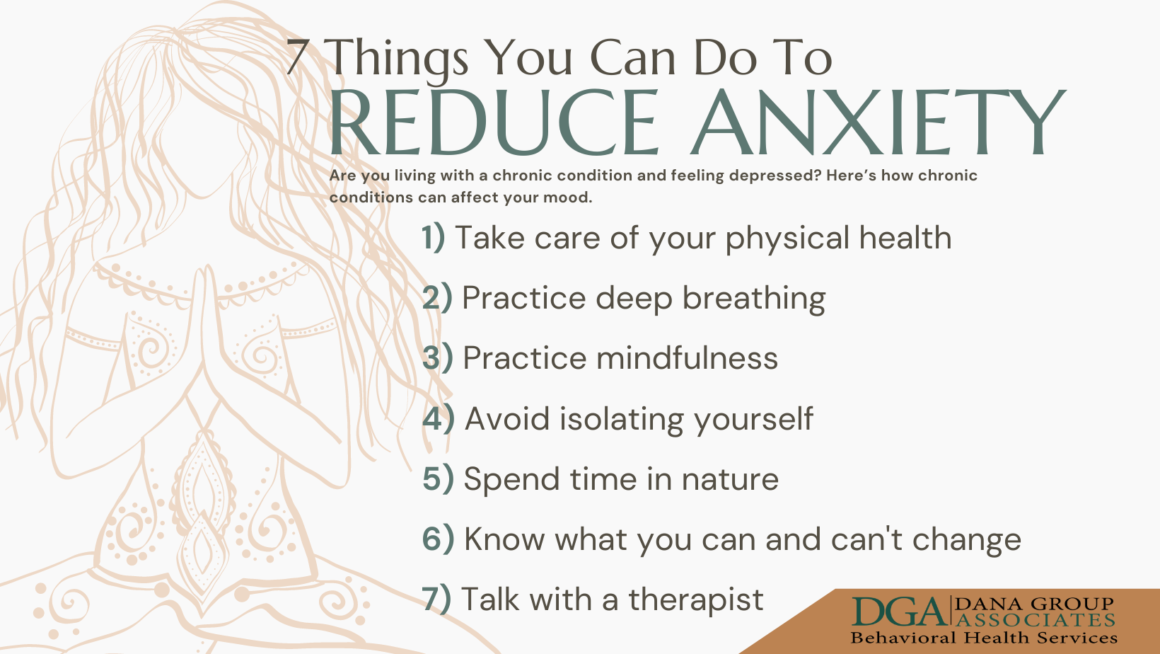Anxiety is the most common mental health problem in the world. In fact, about 264 million people worldwide have anxiety disorders. However, if you’re feeling anxious all the time, you need more than statistics. You need some kind of strategy, and perhaps mental health help, to start feeling less anxious and more like yourself.
Are you living with nearly unbearable anxiety? Set up an appointment with one of our counselors at Dana Behavioral Health.
Why Am I Anxious All the Time?
When someone asks, “why am I anxious all the time,” the answer might seem difficult or even impossible to discover. Anxiety can happen for many reasons, and there is usually a combination of factors involved.
Why Am I Anxious When Others Aren’t?
Sometimes it can seem unfair that you struggle with anxiety while others don’t seem to experience the slightest fear or nervousness. So, there are really two questions at play here. 1) Why me? 2) Why anxiety?
It’s important to remember that each person has their own challenges to deal with in life. Besides that, you can’t always tell when someone else is anxious. That’s especially true if you aren’t a trained mental health professional. Therefore, focusing on your own needs is the best way to make progress in managing your anxiety.
What Causes Anxiety?
Of course, scientists have been studying anxiety for a long time. In doing so, they have found several factors that can combine to produce an anxiety disorder. The following are some of those components that could go together to create anxiety.
- Family history: If someone in your family has an anxiety disorder or any type of mental health condition, you may be more likely to have anxiety.
- Personality: Your personality may be such that you are more prone to anxiety than others. Personality traits like being too perfectionistic, timid, inhibited, or easily flustered can make you more susceptible to anxiety.
- Life stressors: Stress can make you more prone to anxiety. The stress can be coming from your job, a change in residence, relationship problems, traumatic events, abuse, or the loss of a loved one, to name a few.
- Chronic physical health issues: Certain chronic conditions can increase your chances of having anxiety. These include diabetes, asthma, high blood pressure, and heart disease.
- Other mental conditions: If you have anxiety, you might also have other mental health conditions like depression. So, it’s best to talk to a professional who can uncover any other issues that occur along with anxiety.
- Substance abuse: Sometimes, anxiety can seem so hard to manage that people begin to use substances like drugs or alcohol in an attempt to tame the anxiety. Unfortunately, substance abuse can make the anxiety worse, and now they have a substance use disorder, too.
Remember, all of these causes might not apply to you. Everyone is unique, and different factors go together to cause anxiety for each person. The most important thing here is that you find someone to help you who knows how to deal with anxiety once you have it. Your therapist can help you do that.
Wondering why you’re anxious all the time? Schedule an appointment with a therapist at Dana Behavioral Health for anxiety help.
What Can I Do About My Anxiety?

Knowing why you have anxiety can make you feel better about yourself. It could also suggest a path toward reducing your anxiety. However, the most important thing you need to know right now is what you can do about your anxiety. Here are some strategies for managing your anxious feelings.
Take Care of Your Physical Health
Anxiety affects your body, and the state of your body affects your level of anxiety. Your physical health can have a significant impact on mental health conditions, including anxiety. So, put more of your focus and energy into taking care of your physical health. The following changes could help reduce your tendency to feel anxious.
Eat the right amount of healthy foods and stay hydrated. Get some exercise every day. Avoid stimulants, such as caffeine or nicotine. Sure, it might seem strange to stop drinking coffee or caffeinated sodas if you always have. However, if it could reduce your anxiety, it might be worth it to you.
If you have diabetes, be sure to follow your treatment plan as closely as you can. But don’t panic if you make a minor mistake. Perfectionism can lead to anxiety, too. For those with other chronic conditions, be sure to follow your doctor’s orders.
It’s also important to get the right amount and quality of sleep. As someone dealing with anxiety, you might find yourself overthinking as you lie in bed, trying to sleep. One solution is to practice visualization exercises, picturing a happy, peaceful place.
Try Deep Breathing
Deep breathing helps your body and mind slow down and become more peaceful. Anyone can do this; you simply breathe in deeply and slowly release as you exhale. You can also practice other deep breathing techniques. Here’s one you can try.
- Sit or lie down with one hand on your stomach and one on your chest.
- breathe in through your nose and out through your mouth. Let your stomach rise as you breathe in. As you breathe out, tighten your stomach muscles and breathe out forcefully.
Focusing on your breathing in this way can help you clear your mind as you relax your body.
Practice Mindfulness
Mindfulness is developing a heightened awareness of your sensory experiences. An easy mindfulness exercise is just to sit quietly, noticing everything you see, hear, smell, taste, and touch sensations. Mindfulness is something you can practice in so many different ways that you can always try something new.
Another mindfulness exercise is to get several small food items, such as a grape, an olive, a nut, and a cracker. Start with the first food. Look at it carefully. Then, smell it, and notice its scent. Put it in your mouth, and notice its texture and taste. Notice if it makes a sound when you bite into it. Do this with each item. There is virtually no limit to the different mindfulness exercises you can do.
Avoid Isolating Yourself
When you’re feeling anxious, you might be tempted to hide out from the whole world. However, the more you shelter yourself, the more overwhelming your anxiety will likely become. Yet, you may not feel capable of being out with others all the time. That’s okay. You don’t have to transform into a social butterfly. Instead, get out among others sometimes. Establish a healthy balance that works for you.
Spend Time in Nature
Getting out and enjoying nature has been proven to reduce anxiety. So, go to the park and take a walk. Work in your garden. Go to the local botanical gardens. Look for natural settings around where you live. The fresh air, sunshine, and beautiful scenery can make you forget your anxiety.
Know What You Can and Can’t Change
It’s very easy to find yourself constantly worrying about things that you can’t change, anyway. There is really no benefit to mulling over an impossible situation. So, rather than dwelling on something you have no power to control, focus on what you can change. Then, work towards that goal.
Talk about Your Anxiety with a Professional
Despite all the many ways to reduce anxiety, sometimes, you need expert help. At Dana Behavioral Health, you can talk to a counselor about the events and problems behind your anxiety. You can address your concerns and learn anxiety management techniques. We also offer medication management if you need anxiety meds. Meanwhile, your counselor can teach, guide, and offer emotional support as you move toward a more peaceful and productive mindset.
Are you ready to find the answers to managing your anxiety? Call us now at Dana Behavioral Health for anxiety help.
